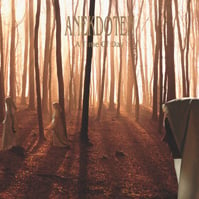| Author |
 Topic Search Topic Search  Topic Options Topic Options
|
JJLehto 
Prog Reviewer


Joined: April 05 2006
Location: Tallahassee, FL
Status: Offline
Points: 34550
|
 Topic: Hey! My book is now out! Topic: Hey! My book is now out!
Posted: November 14 2015 at 00:19 |
Awesome news! And the type of thing that's right up my alley. I'll be sure to give it a read  |
 |
Dean 
Special Collaborator


Retired Admin and Amateur Layabout
Joined: May 13 2007
Location: Europe
Status: Offline
Points: 37575
|
 Posted: November 12 2015 at 01:11 Posted: November 12 2015 at 01:11 |
Yeah, right 
|
|
What?
|
 |
emigre80 
Forum Senior Member


Joined: January 25 2015
Location: kentucky
Status: Offline
Points: 2223
|
 Posted: November 11 2015 at 21:02 Posted: November 11 2015 at 21:02 |
 timothy leary wrote: timothy leary wrote:
Will we hear more from this young historian? |
I had to break it to my publishers that they really shouldn't use that quote 
|
 |
emigre80 
Forum Senior Member


Joined: January 25 2015
Location: kentucky
Status: Offline
Points: 2223
|
 Posted: November 11 2015 at 21:01 Posted: November 11 2015 at 21:01 |
 The Dark Elf wrote: The Dark Elf wrote:
 emigre80 wrote: emigre80 wrote:
Haha, the Washington Times has decided I'm a fellow liberal-bashing neocon: is there an emoticon for rolling around in the floor laughing? |
You're such a fascist, Terri!  |
Outed by the Washington Times...oh, the humiliation!
|
 |
The Dark Elf 
Forum Senior Member


VIP Member
Joined: February 01 2011
Location: Michigan
Status: Offline
Points: 13358
|
 Posted: November 11 2015 at 17:05 Posted: November 11 2015 at 17:05 |
 emigre80 wrote: emigre80 wrote:
Haha, the Washington Times has decided I'm a fellow liberal-bashing neocon: is there an emoticon for rolling around in the floor laughing? |
You're such a fascist, Terri! 
|
|
...a vigorous circular motion hitherto unknown to the people of this area, but destined
to take the place of the mud shark in your mythology...
|
 |
timothy leary 
Forum Senior Member


Joined: December 29 2005
Location: Lilliwaup, Wa.
Status: Offline
Points: 5319
|
 Posted: November 11 2015 at 17:02 Posted: November 11 2015 at 17:02 |
|
Will we hear more from this young historian?
|
 |
emigre80 
Forum Senior Member


Joined: January 25 2015
Location: kentucky
Status: Offline
Points: 2223
|
 Posted: November 11 2015 at 13:42 Posted: November 11 2015 at 13:42 |
Haha, the Washington Times has decided I'm a fellow liberal-bashing neocon: is there an emoticon for rolling around in the floor laughing?
|
 |
Man With Hat 
Collaborator


Jazz-Rock/Fusion/Canterbury Team
Joined: March 12 2005
Location: Neurotica
Status: Offline
Points: 166183
|
 Posted: November 09 2015 at 15:50 Posted: November 09 2015 at 15:50 |
I'll add my belated congratulations to the list!
|
|
Dig me...But don't...Bury me
I'm running still, I shall until, one day, I hope that I'll arrive
Warning: Listening to jazz excessively can cause a laxative effect.
|
 |
Nightfly 
Special Collaborator


Honorary Collaborator
Joined: August 01 2007
Location: United Kingdom
Status: Offline
Points: 3659
|
 Posted: November 07 2015 at 13:13 Posted: November 07 2015 at 13:13 |
|
Sounds like an interesting read. Congratulations!
|
 |
someone_else 
Forum Senior Member


VIP Member
Joined: May 02 2008
Location: Going Bananas
Status: Offline
Points: 24810
|
 Posted: November 07 2015 at 12:21 Posted: November 07 2015 at 12:21 |
|
Congratz!
|
|
|
 |
emigre80 
Forum Senior Member


Joined: January 25 2015
Location: kentucky
Status: Offline
Points: 2223
|
 Posted: November 07 2015 at 12:00 Posted: November 07 2015 at 12:00 |
^ as Oscar Wilde once said, the only thing worse than being talked about is
not being talked about. My "reviews" certainly bear that out.
|
 |
The Dark Elf 
Forum Senior Member


VIP Member
Joined: February 01 2011
Location: Michigan
Status: Offline
Points: 13358
|
 Posted: November 07 2015 at 11:32 Posted: November 07 2015 at 11:32 |
Congrats, Terri! You know I'll be ordering it. Oh, and the reviews are coming in from some very famous people: This is not a book to be tossed aside lightly. It should be thrown with great force. -- Dorothy Parker From the moment I picked your book up until I laid I down I was convulsed with laughter. Some day I intend reading it. -- Groucho Marx Your manuscript is both good and original; but the part that is good is not original, and the part that is original is not good. -- Samuel Johnson Very nice, though there are dull stretches. -- Antoine de Rivarol The Devil damn thee black, thou cream-faced loon! -- William Shakespeare The verses, when they were written, resembled nothing so much as spoonfuls of boiling oil, ladled out by a fiendish monkey at an upstairs window upon such of the passers-by whom the wretch had a grudge against. -- Lytton Strachey A louse in the locks of literature. -- Alfred, Lord Tennyson An idiot child screaming in the hospital. -- H.G. Wells The work of a queasy undergraduate scratching her pimples. -- Virginia Wolfe
|
|
...a vigorous circular motion hitherto unknown to the people of this area, but destined
to take the place of the mud shark in your mythology...
|
 |
Dean 
Special Collaborator


Retired Admin and Amateur Layabout
Joined: May 13 2007
Location: Europe
Status: Offline
Points: 37575
|
 Posted: November 07 2015 at 11:28 Posted: November 07 2015 at 11:28 |
|
|
|
What?
|
 |
emigre80 
Forum Senior Member


Joined: January 25 2015
Location: kentucky
Status: Offline
Points: 2223
|
 Posted: November 07 2015 at 11:25 Posted: November 07 2015 at 11:25 |
 RayRo wrote: RayRo wrote:
Double wow! It also makes a great holiday gift, too! |
Absolutely, it would make a great Christmas gift for everyone on your list. And I hope you all have very long lists. 
|
 |
emigre80 
Forum Senior Member


Joined: January 25 2015
Location: kentucky
Status: Offline
Points: 2223
|
 Posted: November 07 2015 at 11:23 Posted: November 07 2015 at 11:23 |
 Dean wrote: Dean wrote:
 emigre80 wrote: emigre80 wrote:
Hmm, well, I could disagree with at least some of your statements above, but I'll wait till you read the book and then we can have a debate. One thing I will say is that I found very few soldiers in the first month of the war who believed it would be a short war, and similarly little evidence for that view in the newspapers. In fact, those who signed up for the war in the first few months signed up for a duration of three years or until the end of the war, whichever was longer....which means that at least Kitchener figured out it wasn't going to be over quickly. and there were post-1914 fraternizations, which I discuss in chapter 6. Have fun. |
Then perhaps my understanding that the initial belief in Britain was the war would be "over by christmas" is another extrapolated myth. Of course how quickly that initial expectation may have evaporated is another matter, obviously once christmas came and went so did the expectation. I also believe (until now perhaps) that on the German side they never expected the advancements they had made in the first three months would come to such an abrupt stop and they too expected a short war.
I know there were post-1914 truces, but believe they were significantly fewer and much less publicised.
However, I am not questioning your research on this, nor your conclusions, I'm just displaying my lack of knowledge.  |
You certainly don't lack knowledge, but I do think your perspective may shift a bit after reading the book. What I found during the research I completed for the work really did change my mind about a number of things, but at the same time it's worth remembering that you can find support for just about any view you want to take on the war. The question is whether you are cherry-picking to advance a certain argument or whether you are actually going with a "preponderance of the evidence" standard. There were certainly those who thought the war was going to end quickly, but it appeared from my research that this was a minority view. And you are correct, the post-1914 truces were fewer and less well-publicized.
|
 |
Dean 
Special Collaborator


Retired Admin and Amateur Layabout
Joined: May 13 2007
Location: Europe
Status: Offline
Points: 37575
|
 Posted: November 07 2015 at 11:14 Posted: November 07 2015 at 11:14 |
 emigre80 wrote: emigre80 wrote:
Hmm, well, I could disagree with at least some of your statements above, but I'll wait till you read the book and then we can have a debate. One thing I will say is that I found very few soldiers in the first month of the war who believed it would be a short war, and similarly little evidence for that view in the newspapers. In fact, those who signed up for the war in the first few months signed up for a duration of three years or until the end of the war, whichever was longer....which means that at least Kitchener figured out it wasn't going to be over quickly. and there were post-1914 fraternizations, which I discuss in chapter 6. Have fun. |
Then perhaps my understanding that the initial belief in Britain was the war would be "over by christmas" is another extrapolated myth. Of course how quickly that initial expectation may have evaporated is another matter, obviously once christmas came and went so did the expectation. I also believe (until now perhaps) that on the German side they never expected the advancements they had made in the first three months would come to such an abrupt stop and they too expected a short war.
I know there were post-1914 truces, but believe they were significantly fewer and much less publicised.
However, I am not questioning your research on this, nor your conclusions, I'm just displaying my lack of knowledge. 
Edited by Dean - November 07 2015 at 11:14
|
|
What?
|
 |
Svetonio 
Forum Senior Member


Joined: September 20 2010
Location: Serbia
Status: Offline
Points: 10213
|
 Posted: November 07 2015 at 10:58 Posted: November 07 2015 at 10:58 |
|
A few of those Chirstmas fraternizations in The Great War also were on the Tessaloniki front between Serbian and Bulgarian troops (both ortodox christians), what was ended by both commands' orders that to kill everyone between trenches.
Edited by Svetonio - November 07 2015 at 11:00
|
 |
RayRo 
Forum Senior Member


Joined: November 02 2015
Location: USA
Status: Offline
Points: 171
|
 Posted: November 07 2015 at 10:52 Posted: November 07 2015 at 10:52 |
 emigre80 wrote: emigre80 wrote:
 Dean wrote: Dean wrote:
 Kati wrote: Kati wrote:
Awww I know this story very well, it's beautiful and sad at the same time, the spirit of Christmas both sides also sang, Oh, Holy Night and Stille Nacht! Heil'ge nacht... they were only soldiers, boys, men who were being told what to do but that night for Christmas they made a truce, for one night only, no fighting, for all to enjoy the spirit of Christmas.  |
That's the romanticised version. As I understand it (and I obviously haven't read Terri's book yet), small truces occurred at various times throughout the first 18 or so months of the war, often to allow each side to collect and bury the bodies of the fallen. The 1914 christmas truce was not a single event, but a number of small impromptu truces along the Western Front (and at least one on the Eastern Front between a few Austrian and Russian troops), not all of these involved carol singing and the exchange of gifts. I also understand it that the idea that there were football matches between the two sides is also somewhat romanticised, the conditions in no-man's land would have been far to grim for that, however several soldier's letters tell of friendly kick-a-bouts occurring during the truces, mostly amongst the men on one side though there are a few were opposing sides played together. |
Much as I hate to disagree with Kati (suppose she stops sending me hugs), Dean is correct. My book is an attempt to correct the romanticized version of the truce, and then use that to disagree with the conventional narrative of the First World War. Here's a passage from the book that sums up my argument: "The Christmas truce, shorn of its mythology, is impossible to categorize
simply, yet even those who challenge the conventional
narrative of the war canít seem to resist the conventional narrative of the
truce. The myth of the 1914 armistice is based on the belief that the soldiers
who took part in it shared our modern sensibilities, hated war as we hate war,
and rebelled against that futile conflict as we are certain we would have
rebelled against it. The truce resonates with us today because we have long
since decided where our sympathies lie, which is with the poets who represented
the soldiers in the trenches and who captured their plight in such vivid
language. As a result, the story of what really happened during the two weeks
that started on Christmas Eve 1914 and finally ended about 10 January 1915
rarely cites the letters and diaries of the men involved, but relies instead on
postwar memories that reinforce what we already believe. Christmas was
celebrated in the trenches on 25 December 1914 as a sentimental rather than a
religious holiday, and the widespread but not universal cease-fires and
fraternizations were entered into in that spirit by a largely professional army
composed of men who supported the war that they were fighting. To comprehend
that viewpoint, it is necessary to reject much of what we now believe about the
First World War, but to continue to impose a narrative on the truce that is
contradicted by the accounts written home by those who took part in it does a
disservice to the very soldiers whom we now view as victimized. They did not
see themselves in that way, and imputing to them a consciousness that thoroughly
misrepresents their perception of the conflict does not help us understand either
the war or the truce." While it is true that there were many references in letters and diaries to football matches, they were mostly to matches that happened elsewhere (i.e., "We heard that XXX battalion played the Germans at football") and only three references to matches that actually took place (out of 54 battalions involved), so the idea that everyone played football at the truce(s) is just another myth. Well, I just gave away the ending, so now I've saved you all the trouble of reading the book.  |
Wow! A "warts and all" retelling of this almost mythical event in history. That's something that's definitely up my tree and is also timely for the coming holiday season. Double wow! It also makes a great holiday gift, too!
|
 |
emigre80 
Forum Senior Member


Joined: January 25 2015
Location: kentucky
Status: Offline
Points: 2223
|
 Posted: November 07 2015 at 10:52 Posted: November 07 2015 at 10:52 |
 Dean wrote: Dean wrote:
^ Actually, it makes me want to read it even more. 
Another reason why we shouldn't regard the truce, and subsequently the whole of the war, with modern sensibilities is it the attitude to the war was very different then. After only five months of fighting, of which only the last two had been in the trenches, the mood was still, [erm], optimistic. Both sides believed the war would be short and at that time trench warfare had only ever been used by one side as a defence against advancement by the other. No one expected it to be a protracted entrenchment by both sides leading to a stalemate of attrition, none had ever experienced war on an industrial scale and no one could know the full horrors that modern trench warfare would bring. There would have been fewer (if any) truces in subsequent years as the realities of the situation became more apparent even without the field orders that expressly forbade fraternisation issued after the 1914 christmas truces.
...okay, so I'm way more interested in this subject that I thought - I've just pre-ordered the book.  |
Hmm, well, I could disagree with at least some of your statements above, but I'll wait till you read the book and then we can have a debate. One thing I will say is that I found very few soldiers in the first month of the war who believed it would be a short war, and similarly little evidence for that view in the newspapers. In fact, those who signed up for the war in the first few months signed up for a duration of three years or until the end of the war, whichever was longer....which means that at least Kitchener figured out it wasn't going to be over quickly. and there were post-1914 fraternizations, which I discuss in chapter 6. Have fun.
|
 |
Dean 
Special Collaborator


Retired Admin and Amateur Layabout
Joined: May 13 2007
Location: Europe
Status: Offline
Points: 37575
|
 Posted: November 07 2015 at 10:47 Posted: November 07 2015 at 10:47 |
^ Actually, it makes me want to read it even more. 
Another reason why we shouldn't regard the truce, and subsequently the whole of the war, with modern sensibilities is it the attitude to the war was very different then. After only five months of fighting, of which only the last two had been in the trenches, the mood was still, [erm], optimistic. Both sides believed the war would be short and at that time trench warfare had only ever been used by one side as a defence against advancement by the other. No one expected it to be a protracted entrenchment by both sides leading to a stalemate of attrition, none had ever experienced war on an industrial scale and no one could know the full horrors that modern trench warfare would bring. There would have been fewer (if any) truces in subsequent years as the realities of the situation became more apparent even without the field orders that expressly forbade fraternisation issued after the 1914 christmas truces.
...okay, so I'm way more interested in this subject that I thought - I've just pre-ordered the book.  |
|
What?
|
 |
Donate monthly and keep PA fast-loading and ad-free forever.
/PAlogo_v2.gif)
/PAlogo_v2.gif)


